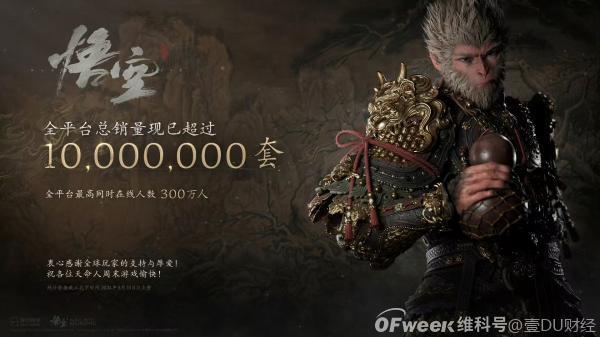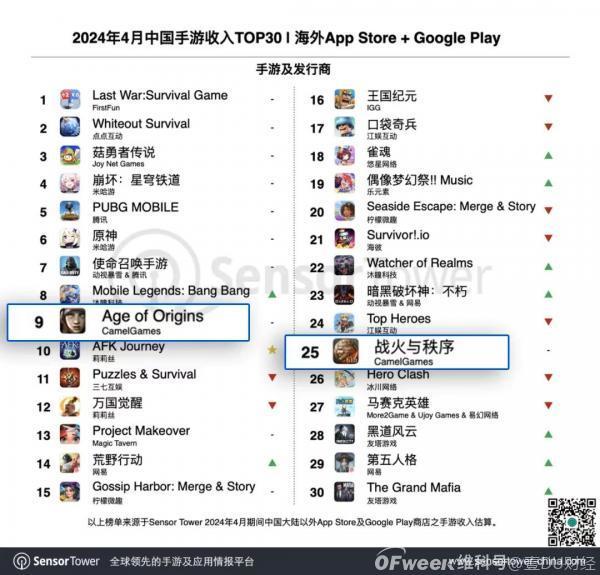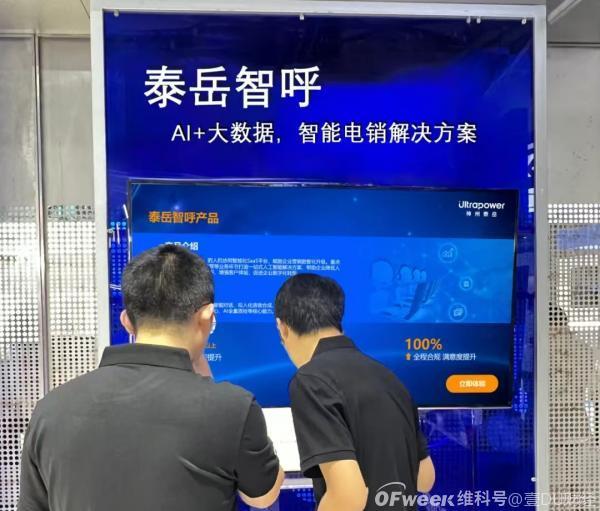From Fetion to "War and Order", there's a mysterious company behind it all
![]() 09/06 2024
09/06 2024
![]() 553
553

On August 20th, the first domestically produced 3A game, "Black Myth: Wukong", surpassed 10 million copies sold within three days of its release, with a peak concurrent online player count of 3 million across all platforms, igniting both domestic and international interest. According to VG Insights data, as of now, "Black Myth: Wukong" has sold a total of 16.9 million copies, generating over $812 million in revenue (equivalent to approximately RMB 5.75 billion).

Black Myth Wukong Official Weibo
Even today, the popularity of "Black Myth: Wukong" remains undiminished as a topic of national conversation. Beyond the game itself, more people are paying attention to 3A games. At this point, people are surprised to learn just how profitable 3A games can be. But beyond 3A games, there are also a group of low-budget, low-profile game companies quietly making money.
One such company is Shenzhen Triquetra Technology Co., Ltd. On August 27th, Shenzhen Triquetra released its 2024 interim report, boasting impressive results. According to the financial report, the company's total operating revenue reached RMB 3.053 billion, an increase of RMB 399 million compared to the same period last year. Game revenue accounted for RMB 2.426 billion, or 79.46% of total revenue. Net profit attributable to shareholders was RMB 631 million, an increase of RMB 227 million, or 56.18%, over last year. Net cash inflow from operating activities was RMB 590 million, an increase of RMB 194 million, or 48.97%, over last year.
Shenzhen Triquetra has long been known in the industry for its profitability, but few people know the reasons behind its high revenue. Besides games, what other businesses does Shenzhen Triquetra profit from?
01 The disappearance of Fetion and the rise of Shenzhen Triquetra
Shenzhen Triquetra is increasingly known as a game company, but earlier on, it gained fame as a service provider for China Mobile.
Founded in 1998, Shenzhen Triquetra initially focused on ICT operation and maintenance services, providing specialized IT services to clients, including digital new IT operations, information security management, and cloud value-added services.
In 2003, Shenzhen Triquetra launched its self-developed system network management platform software, transforming from an agent into an IT service management software enterprise with independent intellectual property rights.
In 2005, Shenzhen Triquetra acquired the IT service management business of Shanghai Lianying Digital Technology Co., Ltd., another leader in the field of IT management, solidifying its position as an industry leader in market share.
In 2006, Shenzhen Triquetra secured its largest client and the source of its rise – China Mobile. By undertaking China Mobile's Fetion project, Shenzhen Triquetra's ICT operation business flourished, transforming the company into a leading domestic provider of comprehensive IT solutions.

Shenzhen Triquetra WeChat Official Account
As the exclusive outsourcing service provider for China Mobile's Fetion business, Fetion became a significant source of revenue for Shenzhen Triquetra. According to the company's prospectus, from 2006 to 2009, Shenzhen Triquetra's revenue from the telecommunications industry accounted for 71.10%, 82.99%, 81.51%, and 92.02% of its total revenue, respectively, indicating an over-concentration in the telecommunications sector.
Riding the wave of Fetion's rapid penetration, Shenzhen Triquetra became one of the first 28 companies listed on the Shenzhen Stock Exchange's ChiNext board in 2009, becoming the highest-priced stock in the A-share market that year. Its share price surged from RMB 102.9 on its listing day to RMB 237 on April 13, 2010, with a peak market value of RMB 30 billion.
However, post-IPO results were disappointing. By mid-2011, Fetion had surpassed 80 million daily active users, making it the second most popular social media platform in China after QQ. After peaking, Fetion's user base and activity gradually declined, exposing issues.
At the time, Fetion operated a closed system that excluded users from other operators, limiting it to China Mobile subscribers. This forced users of other operators to abandon Fetion, while the unrestricted WeChat emerged as a competitor, eroding Fetion's user base.
As the exclusive outsourcing service provider for Fetion, Shenzhen Triquetra was significantly impacted. From 2010 to 2012, Shenzhen Triquetra's over-reliance on the Fetion business led to declining performance. Financial reports showed an average annual net profit growth rate of 16.82% during this period, significantly lower than the 153.35% growth rate from 2007 to 2009 before the IPO.
Shenzhen Triquetra's transformation was imminent. "When the entire industry is declining, companies must transform," said Wang Ning, Chairman of Shenzhen Triquetra. "Transformation is especially challenging for private enterprises, especially listed ones, due to financial reporting pressures."
02 Crossover into gaming, ushering in a new era
Starting in 2013, as smartphones gradually became ubiquitous, Fetion was largely replaced by WeChat. Concurrently, the rapid growth of the smartphone market fueled the development of the mobile gaming market. According to Analysys International research data, the domestic smartphone gaming market exceeded RMB 6 billion in size by the end of 2012 and was projected to exceed RMB 20 billion by 2015, with a compound annual growth rate of approximately 49%, marking the rapid rise of the domestic gaming market.
After years of experience in the IT software field, Wang Ning recognized the vast potential of the mobile gaming market and decided to enter the gaming industry, a move that propelled Shenzhen Triquetra towards revenue growth.
In 2013, Shenzhen Triquetra ventured into the mobile gaming industry by acquiring Shellmob Games. With the help of an intermediary, Shenzhen Triquetra acquired 100% of Shellmob's equity for a staggering 27-fold premium of RMB 1.215 billion, facilitating the company's transformation.

Shenzhen Triquetra WeChat Official Account
Founded in 2009, Shellmob Games was one of the earliest pioneers in exploring overseas gaming markets. In late 2011, Shellmob Games released "Little Empire," officially entering the overseas SLG (strategy) gaming market and becoming the first Chinese mobile game development team to receive Google's Top Developer certification.
After completing the acquisition in April 2014, Shenzhen Triquetra officially entered the game development and operation sector, adopting a strategy of "developing high-quality games and focusing on the global market."
In subsequent years, Shellmob Games released "War and Order" (a medieval fantasy war strategy game) in 2016 and "Age of Origins" (a post-apocalyptic zombie strategy game) in 2018, both targeting overseas markets and becoming significant revenue sources for Shellmob Games.
The 2024 interim report showed that "Age of Origins" generated RMB 1.79 billion in revenue, while "War and Order" contributed RMB 560 million, with overall game revenue reaching RMB 2.426 billion, accounting for 79.46% of Shenzhen Triquetra's total revenue. To this day, gaming remains one of Shenzhen Triquetra's most profitable businesses.

Shenzhen Triquetra WeChat Official Account
From a profitability standpoint, Shenzhen Triquetra is undoubtedly successful. However, as a gaming company venturing overseas, this is far from sufficient.
"Black Myth: Wukong" is currently the hottest topic of conversation. According to data from Gamelytic, since its release on August 20th, "Black Myth: Wukong" has sold over 10.7 million copies, received over 97% positive reviews, boasted an average gameplay time of 9.7 hours, and generated over $400 million in revenue.
According to Feng Ji, founder of Game Science Studio, the hourly development cost of "Black Myth: Wukong" is approximately RMB 15-20 million. To provide players with at least 20 hours of gameplay, the development cost would exceed RMB 2 billion. Remarkably, "Black Myth: Wukong" recouped its development costs on its launch day.
Moreover, the significance of "Black Myth: Wukong" extends beyond its financial success. From its gameplay mechanics to its visual presentation, the game is deeply rooted in Chinese culture, transcending mere superficial elements.
Domestically, "Black Myth: Wukong" significantly fills the niche for 3A games with a Chinese cultural backdrop. Internationally, it leverages the Journey to the West IP to disseminate Chinese culture through storytelling, visuals, and music, fostering cultural confidence.
In the future, high-quality Chinese cultural games like "Black Myth: Wukong" may emerge as a new direction for cultural exports, aligning with Shenzhen Triquetra's aspirations.
03 Diversified business lines, soaring profits
From ICT operation and maintenance to gaming, Shenzhen Triquetra has successfully transformed, establishing a dual-track business structure centered on gaming and computing.
However, Shenzhen Triquetra's journey to profitability has not been without challenges. In 2019, the company reported a net loss of RMB 1.474 billion, shocking the industry. The root cause was its involvement in the internet finance sector.
In January 2015, Shenzhen Triquetra invested in iCai Technology, venturing into internet finance. In December 2019, iCai Technology imploded amid allegations of illegal fund-raising, leaving a loan balance of RMB 1.319 billion on its "Mizhuang" platform. Shenzhen Triquetra's stake in iCai Technology was frozen, and its investment could not be recovered, resulting in a significant funding gap.
This situation did not last long. Since 2020, with its diversified business lines in computing, gaming, and AI, Shenzhen Triquetra's performance has rebounded significantly.
Looking back on its over two decades of development, Shenzhen Triquetra has made strategic decisions that have capitalized on emerging trends. In recent years, as the industry has embraced "All in AI," Shenzhen Triquetra has not lagged behind.
In 2022, Shenzhen Triquetra launched the "Taiyue Xiaocui" AI debt collection solution, combining traditional operations with AI technology to enhance collection efficiency. In the second half of 2023, the platform was upgraded to "Taiyue Zhihu," focusing on intelligent telemarketing and collections, offering SaaS solutions to the market.

Shenzhen Triquetra WeChat Official Account
Data shows that since the beginning of 2023, Shenzhen Triquetra's debt collection business has progressed steadily, displaying a clear month-on-month growth trend. Monthly revenue has risen steadily from an initial few million RMB to over RMB 7 million in October 2023.
It has come as a surprise to many that AI debt collection can be so profitable, and that the company behind it is none other than Shenzhen Triquetra, once again positioning itself at the forefront of profitable ventures.
The 2024 interim report revealed total revenue of RMB 3.053 billion and net profit of RMB 631 million, a year-on-year increase of 56.18%. The debt collection business is categorized under the AI segment of software and information technology services, which contributed over RMB 600 million to total revenue in the first half of the year, representing a year-on-year growth of over 30%.
Beyond AI debt collection, in 2024, Shenzhen Triquetra also launched the Wangyuanjing family tablet, integrating mobile TV, tablet, and learning functions, signaling the company's foray into the education sector. Previously, companies like Seewo, iFLYTEK, Xueersi, and Baidu have introduced learning tablets and established a presence in the industry for years, posing significant competition for Shenzhen Triquetra.

Shenzhen Triquetra WeChat Official Account
However, Shenzhen Triquetra's involvement in the education sector dates back to 2018, when it capitalized on policy changes. By collaborating with Beijing Electronic Information Technician College on the "Intelligent Semantic Recognition Training System Construction Project," Shenzhen Triquetra leveraged AI to enhance education. The company set up text analysis and mining training platforms, internet information collection systems, and AI-related educational software, offering systematic AI education courses covering concepts, technologies, and applications.
Judging from its previous transformations, Shenzhen Triquetra has undoubtedly been successful in capitalizing on profitable opportunities and diversifying its business lines. Remarkably, it has consistently generated revenue through each transformation.
Conclusion
From ICT operation and maintenance to gaming exports and AI IoT, Shenzhen Triquetra has emerged as one of the most successful and profitable companies in terms of transformation, a model envied by many.
However, Wang Ning, Chairman of Shenzhen Triquetra, once stated, "Shenzhen Triquetra aims to be a respected enterprise, not just a profitable one." This remains an ongoing challenge for the company.
Images sourced from the official website. Infringement will be removed upon request.








